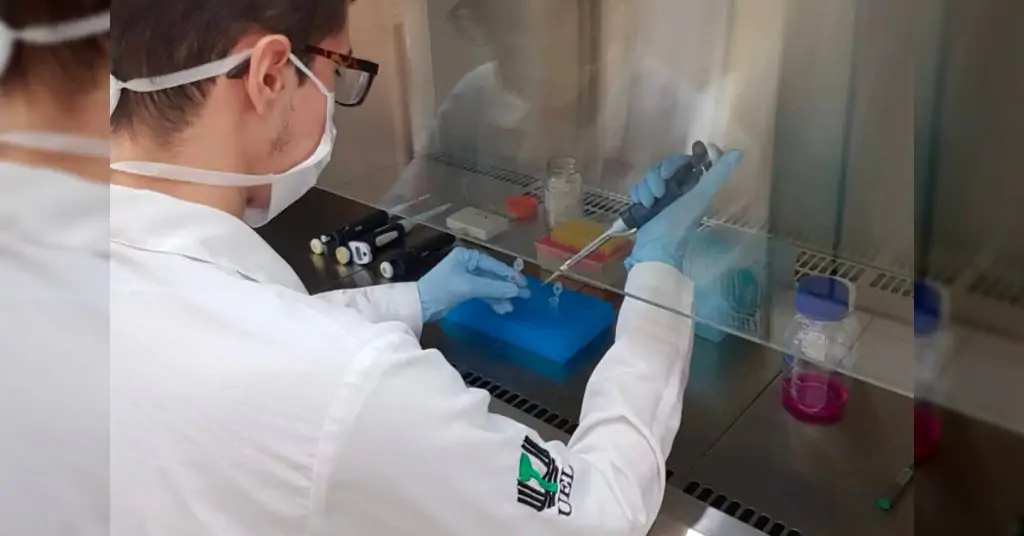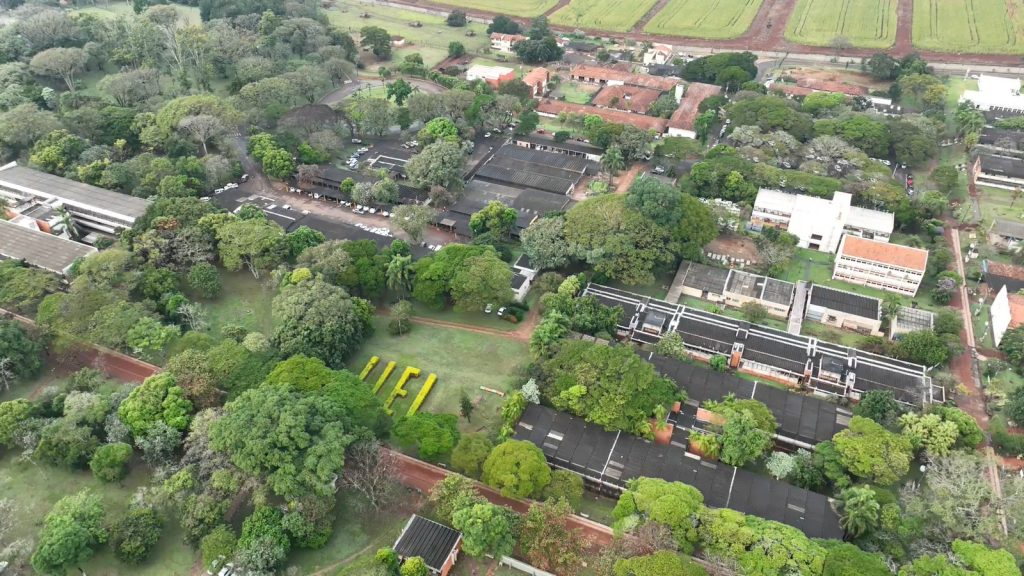[EN] Three graduate programs at UEL are rated top grade (7) in CAPES evaluation
[EN] Three graduate programs at UEL are rated top grade (7) in CAPES evaluation
Matéria originalmente publicada em português na edição nº 1416 do Jornal Notícia. Traduzido pela equipe do Paraná Fala Inglês.In 2022, the State University of Londrina (UEL) welcomed two new Graduate Programs that received a remarkable rating of 7 in the Quadrennial Evaluation conducted by the Coordination for the Improvement of Higher Education Personnel (Capes). Following a thorough examination of the public documents that serve as benchmark in the evaluation process, the Programs in Animal Science (Agrarian Sciences Department – CCA)* and Experimental Pathology (Biological Science Department)** achieved the highest rating, indicating a performance on par with international quality standards. As a result of this outcome, both programs now join the ranks of PECEM (Graduate Program of Science and Math Education – CCB) as the top-rated programs at UEL, according to the most recent evaluation.
According to Professor Flávia Alessandra Guarnier, the coordinator of the Graduate Program in Experimental Pathology Graduate, this achievement is an important sign of recognition, given that the Graduate Program in Experimental Pathology (PPPGPE) is confined to the Department of Pathological Sciences and has been investing in fundamental scientific research “We are situated within Capes’ Medicine II area, with a subarea of Anatomical Pathology and Clinical Pathology. It is a predominantly medical subarea, and we are a program that has pioneered this approach. We proposed incorporating basic science work within the medical field while collaborating with other areas. We received support from the field’s coordinators to progress, and we embraced their suggestions. Therefore, it is important for us as it recognizes the role of basic science within the medical field,” she evaluates, while also acknowledging the role of her predecessors in the program’s coordination, professors Rubens Cecchini and Wander Pavanelli.
Similarly, João Luís Garcia, the coordinator of the Graduate Program in Animal Science (PPG-CA), emphasizes that this recognition through the excellence rating is a triumph for the entire university. It positions the research conducted at UEL in the spotlight, both in Brazil and internationally, including countries in Latin America. “We receive students from all over Brazil and Spanish-speaking countries such as Colombia, Paraguay, and Mexico, mainly from the Americas, who show interest in our programs. We believe that within our courses, we serve as a reference point due to our professors’ active involvement in significant organizations.” He mentions faculty members actively involved with the Pan American Health Organization (PAHO), Ministries of Health and Agriculture, the Agropecuary Defense Agency (Adapar), and livestock associations. “Undoubtedly, within the realm of the graduate program, UEL stands as a leading force in the southern region of the country, consistently demonstrating its strength for a long time,” he celebrates.

Pioneering Efforts
The Graduate Program in Science Education and Mathematics Education, established in 2001 at the Master’s level, is a pioneering initiative in the state of Paraná. It was created to meet the growing demand for continuing education for teachers at various levels of education. At that time, nine professors from five departments at UEL (Physics, Mathematics, Biology, History, and Philosophy) collaborated to establish the program, and “six of them are still actively involved”, according to coordinator Fabiele Cristiane Dias Broietti, a faculty member in the Department of Chemistry.
In 2007, the program was expanded with the creation of the Doctorate program and was gradually structured into three research lines: Knowledge Building in Sciences and Mathematics, Teacher Education, and History and Philosophy of Science and Mathematics.
With the consolidation of their work, positive results soon emerged. The program became the first at UEL to achieve a rating of 7 in the Quadrennial Evaluation conducted by Capes, covering the period from 2013 to 2016. Not only was it the first program at the institution to achieve this rating, but it also maintained the highest rating among universities nationwide in the subsequent quadrennial evaluation from 2017 to 2020, as highlighted by Mariana Soares de Andrade, the vice-coordinator and current director of Graduate Studies at UEL. In the following evaluation, programs in the field of Mathematics Education at institutions such as São Paulo State University (Unesp) and Health Education programs at the Oswaldo Cruz Foundation (Fiocruz) also achieved the rating of excellence.
According to the coordinator, maintaining the rating of 7 is the result of the collective effort of the entire faculty, which consists of 16 professors, eight of whom are Capes fellowship recipients. The program also collaborates with researchers from countries such as France, Argentina, Chile, and the United States, as well as engaging in international initiatives such as a continuing education program in partnership with Licungo University (UniLicungo) in Mozambique.
To celebrate the 20th anniversary of the creation of the PECEM, the faculty is organizing the publication “PECEM: 20 years of Science Education and Mathematics Education,” announced coordinator Fabiele Cristiane Dias Broietti, expressing their enthusiasm for this milestone.
Animal Science Graduate Program
The Graduate Program in Animal Science, which has been in existence for over 30 years, is divided into two concentration areas: Animal Health and Animal Production. Despite facing a limitation imposed by a Capes rule that only allows three programs to occupy the highest rating space in the country, the program achieved a high rating, explained coordinator João Luís Garcia. He highlighted that Brazil has around 140 graduate programs in Veterinary Medicine, and currently, only seven, including UEL’s program, hold the highest rating.
One of the program’s significant contributions is the coordination of the research conducted at the Center of Reference in Human and Animal Toxoplasmosis, involving researchers from all over the country and coordinated by Professor Italmar Teodorico Navarro from the Department of Veterinary Medicine and Preventive Medicine (DMVP). The research conducted by this group played a key role in the development of the National Program for the Control of Congenital Toxoplasmosis, the professor recalls.
“Several protocols of the Ministry of Health originated from here. I myself was a student of Professor Italmar and started working on toxoplasmosis in 1993. Toxoplasmosis started here with Professor Odilon Vidotto, who is now retired, in 1987. He approved the first projects, and from there, we became a reference center for Brazil and the world,” he celebrates.
However, the contributions of the Graduate Program extend beyond that and also include the development of a reagent that rapidly detects the presence of formaldehyde in milk, developed under the coordination of Professor Vanerli Beloti, which generates royalties for the University. Additionally, the program has many projects in areas such as Swine Production, Cattle Production, Sheep Farming, Fish Farming, and Small Animal Care. “We have seen that we have been meeting the demands of society. Whenever we undertake our projects, we always try to address a societal problem, and that keeps changing,” concludes the coordinator.
“With little, we have achieved a lot”
Established through the initiative of 11 professors at UEL, the Graduate Program in Experimental Pathology celebrated its 20th anniversary in 2021. According to the coordinator, Flávia Alessandra Guarnier, the group has “made significant contributions to the field,” especially considering the amount of resources received during this period. “We have equipment and maintenance demands, and even the funding from Capes for the program of excellence, which goes directly to the coordination and is managed separately from the institution, has been decreasing over the years – although it seems to be changing. Therefore, it is worthwhile to have greater investment from the Federal Government,” she urges.
To support this analysis, she recalls that the program is the “birthplace” of the first doctoral thesis recognized by Capes as the most important in the country in 2017 in the field of Medicine II, which was an unprecedented achievement for the State University of Londrina. The thesis by doctoral student Felipe Almeida de Pinho Ribeiro, under the supervision of permanent faculty member Waldiceu Aparecido Verri Junior, addressed the role of substances found in citrus fruits and vegetables in pain inhibition.
At that time, the faculty already had reasons to celebrate, as the program had achieved excellence status, receiving a rating of 6 for the 2013-2016 quadrennial period. It also had alumni working at major Brazilian universities. “Both in the South and Southeast and the Midwest. So, this reach that the program has aimed for since the beginning has yielded returns for institutions. We have students in Mato Grosso and Mato Grosso do Sul, many of whom are contributing to the growth of these institutions, including UFMS, UFGD, and UFMG. With limited resources, we have achieved a lot, but there is still a lack of resources, infrastructure, and streamlining of processes. We face difficulties in spending money, and these are our main challenges,” she says.
Currently, the program has 20 professors, 18 of whom are permanent and two collaborators, divided into five research lines.
*Programa de Ciência Animal (CCA)
**Patologia Experimental (CCB)
Traduzida por Ana Paula Luiz dos Santos Aires, da equipe do Paraná Fala Inglês (PFI). Coordenação: Fernanda Machado Brener.
Matéria originalmente publicada em português na edição nº 1416 do Jornal Notícia: Três programas de pós-graduação da UEL são avaliados com conceito 7.




